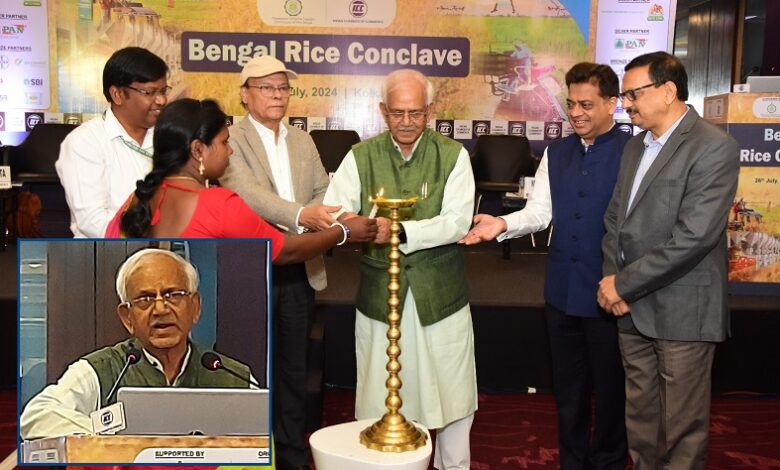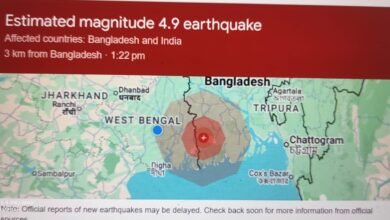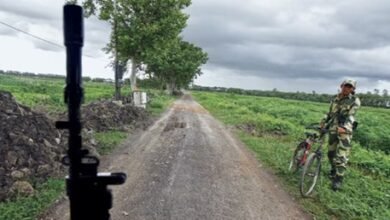Business/TechnologyIndia
Rice has critically important role to play in national & global food security

By : PARTHA ROY
Rice has critically important role to play in food security scape of India and around the world in time ahead.
With the advent of climate change challenges as well as depletion of conducive resources for rice cultivation, there is need for synergistic sustainable efforts for sustainable development of rice cultivation and rice economy .
Bengal Rice Conclave was organized by Indian Chamber of Commerce ( ICC) with support of Government of West Bengal on the inspiration of Chief Minister of West Bengal Smt. Mamata Banerjee on 26th July 2024 in Kolkata.
The conclave had three panel discussions on ‘Best Practice on Farm Management for Quality Rice Production, Seeds, Crop Protection, Micro Irrigation and Climate issues and Technology;’ ‘Sustainable Post-Harvest Practices, Advanced Rice Milling Technologies & Machinery, Efficiency and Productivity in Milling, Modern Rice Storage Techniques;’ and ‘Market Linkage, Financial Schemes and Export Possibilities. Eminent personalities addressed the various sessions of the conclave were Shri Sobhandeb Chattopadhyay, Minister-In-Charge, Department of Agriculture, Government of West Bengal; Shri Arup Roy, Minister, Department of Food Processing Industries and Horticulture, Government of West Bengal; Shri Pradip Kumar Mazumdar, Minister-in-Charge, Department of Panchayats & Rural Development and Cooperation, Government of West Bengal; Mr. Ashutosh Mondal, Director, Department of Agriculture, Government of West Bengal; Prof. Swapan Dutta, Former, DDG-Crops, ICAR, Ministry of Agriculture, Government of India; Dr. Amresh Kumar Nayak, Director, National Rice Research Institute (NRRI), Cuttack; and Mr. Shrikant Goenka, Chairman, Agriculture and Food Processing Committee, ICC amongst many others.
Minister Sobhandeb Chattopadhyay, said, “Rice has been a staple in Bengal for centuries, integral to cultural and religious events. West Bengal, the ‘rice bowl of India,’ contributes 14% of the nation’s rice, featuring rich biodiversity. Over 12 years, significant advances in production and cultivator livelihoods have been made, yet challenges persist, such as climate risks, inadequate seeds, resource depletion, soil health, labour issues and limited mechanisation. Climate change has intensified droughts, floods and cyclones, impacting rice and other crops. The State Government has introduced initiatives, including climate-resilient seeds, crop insurance and direct-seeded rice (DSR). Research focuses on stress-tolerant, hybrid and bio-fortified rice varieties. Efforts to promote indigenous aromatic varieties have expanded cultivation significantly. … Organic farming and sustainable practices like DSR and AWD are promoted to conserve resources and improve soil health….. Today,…. Farmers receive ₹10,000 annually, split into two payments of ₹5,000 each, while those with smaller landholdings receive ₹4,000 annually. Insurance premiums are now fully covered and if a farmer dies before the age of 60, their family receives ₹2 lakh immediately. Farmers over 60 are also provided with pensions. Families of farmers in West Bengal, in particular, are now in a better financial state. Our research centres are dedicated to advancing the agricultural sector, including the development of rice with lower sugar content. We are also exploring alternative cultivation options, such as millet production. Rice remains a staple food across several Indian states, including Bengal, Karnataka, Kerala, Andhra Pradesh, Bihar, Odisha, Assam and Jharkhand. We are optimistic that our ongoing efforts will help bridge existing gaps and further enhance the sector’s resilience.”
Minister Arup Roy, said, “…. Today, Bengal is manufacturing a lot of quality products. In 2011, Govind Bhog and Tulaipanji were very famous in Barddhaman and North Bengal respectively. …. Earlier, the market price of Tulaipanji was around ₹50 per kg, which has now risen to ₹130. ….We are organising the Food Festival at Netaji Indoor Stadium on 9th, 10th and 11th August 2024….” Minister Pradip Kumar Mazumdar, said, “……The Green Revolution of the 1960s, led by Dr. Swaminathan, transformed India into a food-surplus nation, allowing us to feed 1.4 billion people. However, the focus on increasing productivity also led to problems in the agricultural sector. Our approach needs to shift from merely increasing production to managing demand effectively. Since 2012, we have been diversifying rice varieties in West Bengal to help farmers get better prices at the farm gate. This initiative has enabled them to receive up to 40-45% more for certain varieties, despite lower yields. West Bengal is a major rice-producing state that grows summer rice and must balance self-sufficiency with avoiding surplus production. Our challenge is to minimise water usage and reduce methane emissions. This is not just environmentally beneficial but also economically prudent and supportive of farmers’ livelihoods. Additionally, jute is a significant crop in West Bengal. We need to support farmers… offering marketing support and business linkages to keep them informed and profitable.”
Prof. Swapan Dutta, Former, DDG-Crops, ICAR, said, “India’s agriculture sector is thriving, with significant exports. We’re the leading rice-exporting country, earning 46 billion USD from agriculture exports, which underscores the sector’s strength…. Bengal’s rainfall is generally adequate but there’s a need to adopt micro-irrigation for better productivity…. With the right milling systems and technological adoption, Bengal can lead in both productivity and quality……India must remain self-sufficient in rice production, and Bengal plays a crucial role in this. Bengal’s traditional rice variety, Jira, fetches higher prices than Basmati due to its quality and market strategy. This shows the potential for quality rice production and the importance of effective marketing strategies.”
Dr. Amresh Kumar Nayak, Director, National Rice Research Institute (NRRI), Cuttack, said, “National Rice Research Institution (NRRI) has a rich history dating back to 1942 when a severe famine struck Odisha, Jharkhand, Bangladesh and West Bengal, killing over 20 lakh people due to erratic rainfall and disease. In response, during World War II, the British government established the institute to ensure food security in the region. Since then, …. increasing grain production, notably boosting rice output by 10 million tons. Rice, being highly resilient and adaptable to diverse ecologies, remains vital for future food security and climate resilience…..linking rice farming with the market for profitability requires significant research and investment.”
Mr. Shrikant Goenka, Chairman, Agriculture and Food Processing Committee, ICC, said, “Rice stands as a cornerstone in India’s agricultural landscape, intricately woven into its cultural and culinary fabric. West Bengal, a major rice producer, is projected to produce approximately 15.75 million tonnes this year.
…..Traditional flood irrigation methods are no longer sustainable; therefore, adopting modern technologies such as micro irrigation is crucial for increasing yields. The System of Rice Intensification (SRI) method, which maintains paddy fields in a moist rather than inundated state, has demonstrated a 30% increase in rice yields while optimizing water, land, labor, and capital….. Continuous research and development in organic farming, advancements in rice genetics and biodiversity conservation for resilience and yield are commendable….”






